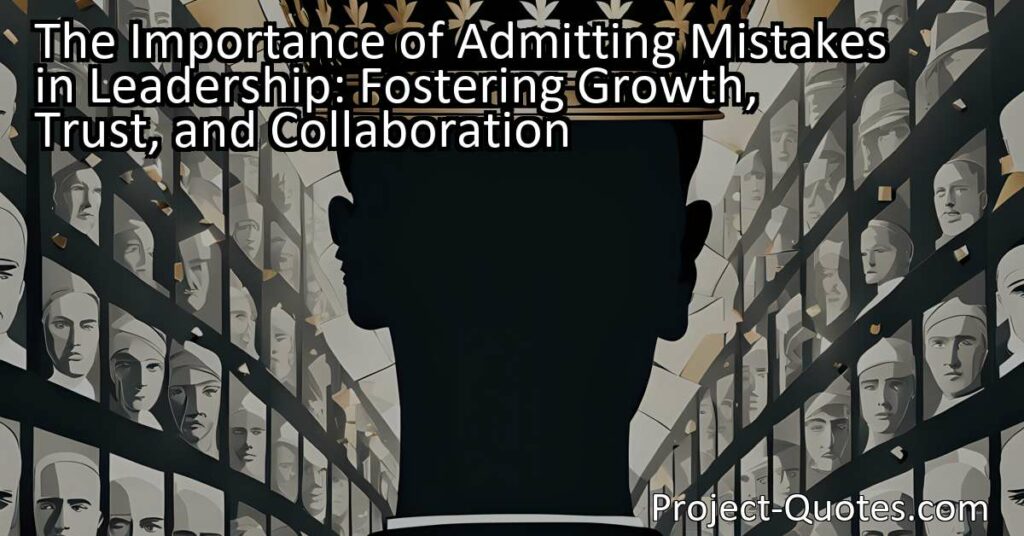The chief qualification of a mass leader has become unending infallibility; he can never admit an error.
Hannah Arendt
The Importance of Admitting Mistakes in Leadership: Fostering Growth, Trust, and Collaboration Leadership requires making tough choices and taking risks, but expecting unending infallibility can be detrimental. Admitting mistakes is a sign of strength and fosters an environment of growth and collaboration. By being transparent about fallibility, leaders inspire trust, encourage innovation, and create positive change.
Table of Contents
Meaning of Quote – The chief qualification of a mass leader has become unending infallibility; he can never admit an error.
In today’s world, where leaders are admired and revered, it is interesting to explore the idea of the chief qualification of a mass leader being unending infallibility, never admitting an error. This notion raises various questions and concerns about the expectations we have from our leaders, the challenges they face, and the possible consequences of such a mindset.
The concept of a leader typically evokes images of someone who possesses great knowledge, skill, and the ability to guide a group of individuals toward a common goal. We often look to leaders for direction, inspiration, and decision making. However, the expectation of unending infallibility can place an enormous burden on those in leadership positions.
Leadership requires making tough choices and taking risks. No one is perfect, and everyone is bound to make mistakes. A leader who is unable or unwilling to acknowledge their errors might find themselves trapped in a cycle of denial, leading to a lack of growth and progress for both themselves and the group they lead.
Admitting mistakes is not a sign of weakness; rather, it is an indication of humility and a willingness to learn and improve. When leaders acknowledge their errors, they set a positive example for others to follow. They demonstrate that it is okay to make mistakes as long as one takes responsibility and learns from them. This fosters an environment of growth and open communication, where everyone feels comfortable admitting their own missteps and working together to find solutions.
Furthermore, the pressure to maintain unending infallibility can have detrimental effects on a leader’s mental health. Constantly feeling the need to be right, never admitting errors, and fearing criticism can lead to high levels of stress and anxiety. This can hinder a leader’s ability to make sound decisions and can negatively impact their well-being and overall effectiveness.
In addition to the personal toll, the infallibility mindset can create a culture of fear and rigidity within an organization or community. When a leader presents themselves as always right and incapable of making mistakes, it leaves little room for innovation, experimentation, and growth. A fear-based environment stifles creativity and discourages individuals from taking risks or challenging the status quo.
On the other hand, leaders who are open about their fallibility inspire trust and loyalty among their followers. They create an atmosphere where people feel valued, empowered, and encouraged to share their ideas and thoughts. By admitting their mistakes, leaders become more relatable and approachable, forging a deeper connection with their team and fostering collaboration.
It is important to note that leaders are not immune to criticism or external scrutiny. In fact, leaders who strive for unending infallibility often face backlash when their flaws are exposed. This can damage their credibility and trustworthiness. On the contrary, leaders who are transparent about their fallibility are more likely to receive support and understanding from their followers, as they are seen as genuine and authentic.
Another aspect to consider is the impact on decision making. Leaders who refuse to admit errors may become stubborn and resistant to change. They might stick to their initial choices even when compelling evidence suggests otherwise. This rigidity can hinder problem-solving and prevent a leader from adapting to new information or circumstances. Flexibility and the ability to admit errors are critical for effective decision making and successful leadership.
In summary, while the idea of a mass leader having unending infallibility may initially sound appealing, it is ultimately a flawed and unrealistic expectation. Leaders who embrace their fallibility and are willing to admit mistakes foster environments of growth, trust, and collaboration. Admitting errors is not a sign of weakness; rather, it is a sign of strength and a willingness to learn and improve. By encouraging leaders to be open and transparent about their fallibility, we can create a more inclusive and supportive society where everyone feels empowered to make positive change.
I hope this quote inspired image brings you hope and peace. Share it with someone who needs it today!


